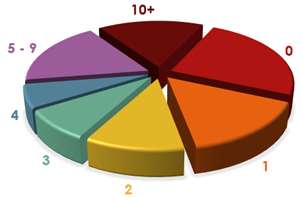The Australian Drug Discovery Library (ADDL)
The Australian Drug Discovery Library (ADDL) collection is a carefully designed library of 330,000 compounds suitable for hit/lead identification via various established compound screening methods (see below). It has been designed to represent a chemical space of over 1 million chemically diverse, lead-like, commercially available compounds from leading vendors.

The collection is stored under industry standard conditions and has been carefully organised into plates suitable for rapid ordering for maximum efficiency over a wide range of screening activities and formats.
Compounds in the ADDL collection have been selected to maximise chemical diversity by carefully controlling the number of near neighbours (highly similar analogues). Approximately two-thirds of the collection has ≤ 4 near neighbours (calculated at 0.6 Tanimoto similarity) to each other (Figure 1). The compounds have been filtered to exclude pan assay interference compounds
(PAINs), reactive sub-structures and other undesirable chemotypes [1]. Physicochemical properties of the collection are constrained within lead/drug-like chemical space to appeal to the needs of a wide variety of applications: molecular weight (MW), logP and topological polar surface area (TPSA) span the range of desirable limits (Figure 2), while the numbers of hydrogen bond donors and acceptors are capped at 5 and 10 respectively, ensuring the compounds are within lead-like and drug-like space (Figure 3).

The collection also maintains a healthy balance of acids, bases and neutral compounds, with a small number of amphoteric compounds, increasing the potential hit rate for targets that may require, or benefit from, an ionisable centre (Figure 4).
In addition, two separate sets of >11,000 macrocycles and 1,300 known drugs, clinical and preclinical compounds are part of the ADDL collection.
Storage, curation, plating and shipping of the ADDL is managed by GRIDD’s Compounds Australia facility (CA), located on the Nathan Campus, Griffith University (https://www.griffith.edu.au/griffith-sciences/compounds-australia). Compounds Australia provides access to critical infrastructure and expertise to ensure flexible, efficient, reproducible, and cost-effective compound management. This is a key advantage for researchers accessing the ADDL resource, where ordering of the compounds is seamlessly handled through the facility’s ordering system and administered by the dedicated operations team. Compounds Australia employs industry standard acoustic dispensing processes that performs a health check of the solution every time a sample is transferred to an assay-ready plate, which ensures accurate sample transfer information is provided.
References
- Chakravorty, S. J. et al. (2018) “Nuisance Compounds, PAINS Filters, and Dark Chemical Matter in the GSK HTS Collection”, SLAS Discovery, 23(6), 532.


